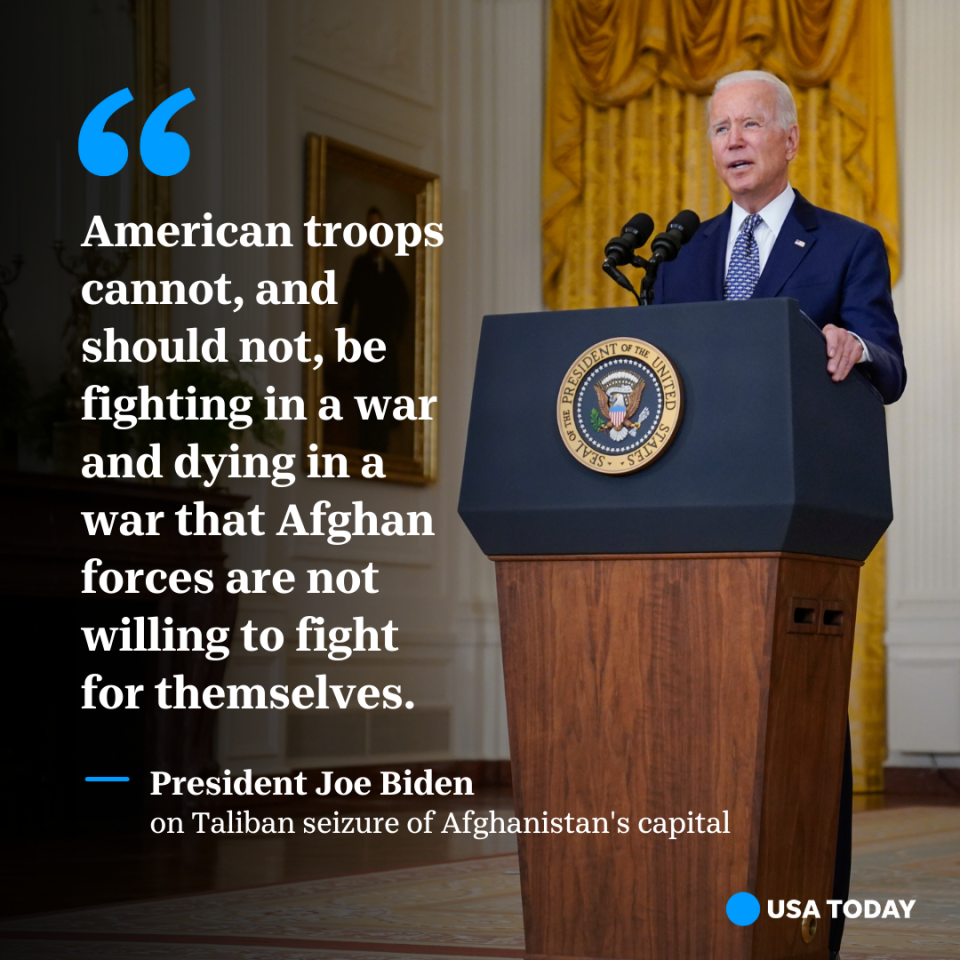George W. Bush made the bigger mistake in Afghanistan
- Oops!Something went wrong.Please try again later.
- Oops!Something went wrong.Please try again later.
President Joe Biden doesn’t deserve the blame for the Taliban taking over Afghanistan. However, he is at fault for the disorderly, dangerous and chaotic end to the U.S. involvement.
The original, and tragic, strategic miscalculation in Afghanistan was made by President George W. Bush. He repeated the error in Iraq.
After the 9/11 attack, the U.S. decided to chase the Taliban from power, since they had harbored al Qaeda. We succeeded quickly at minimum cost and without landing an invasion force. Through cash, intelligence and air support, we tilted the balance of power in a preexisting low-grade civil war against the Taliban.
The Bush administration decided that Saddam Hussein in Iraq was a threat to allow weapons of mass destruction to be used against the United States. We did land an invasion force in Iraq, which quickly deposed Hussein, again at minimal cost and with very limited U.S. casualties.
I supported the engagement in Afghanistan but opposed the Iraq invasion as an imprudent use of military power, arguing that it was too early to give up on containing Saddam through other means.
Where Bush went wrong in Afghanistan
At those points, the U.S. had achieved its security objective in both countries. The national interest would have been best served by then turning them over to the United Nations, which fancies itself as being in the reconstruction and reconciliation business.
The U.N. is inept. But it’s hard to imagine that it could have produced a worse result than current conditions.
The Bush administration, however, had another agenda with respect to Afghanistan and Iraq: turn both into functioning democratic capitalist countries, as a transformative example and model for the rest of the region.
Some neoconservatives deny that such nation-building was a principal objective. But Bush and his senior officials made it explicit at the time that it was. And nothing else explains what followed.
In both countries, the U.S. intervened in internal political structures and decisions. We invested hundreds of billions of dollars to build infrastructure and civil society. We funded, trained, equipped and provided operational support for their security forces.
In both countries, the ancillary objective has been an utter failure. Both countries became politically unstable, dangerous and corrupt.
Biden made the right decision to withdraw

Biden received raspberries for blaming Afghans for failing to fight for their own country in his highly defensive address to the country. But that is the salient and telling development.
Simply put, over the course of two decades the United States has given Afghans ample opportunity to develop a security force willing to fight and a government worth fighting for. Their failure to do so isn’t the fault of the United States or any particular U.S. leader or decision.
President Donald Trump committed the United States to a complete military withdrawal from the country in a deal struck with the Taliban.
Biden has attempted to depict this agreement as having limited his options, but that’s nonsense. The Taliban were already wildly violating the agreement. If he wanted it, Biden had a clean slate to forge his own Afghanistan policy.
He wanted out and so announced his own withdrawal decision.
Removing ourselves from any ongoing military engagement in Afghanistan was the right decision. It was past time for the Afghans to stand, or fall, on their own.
An orderly withdrawal was possible
However, the takeover by the Taliban was foreseeable, even probable.
The Taliban already had expanded their writ in the country. The Afghan security forces already had a considerable record of just melting away in a confrontation with the Taliban. The Taliban were willing to fight. Afghan security forces were not. Not hard to foresee what would happen without the United States wielding the bigger club.
While it was not in the U.S. national interest to perpetually prop up a non-Taliban government, we did have residual obligations to the tens of thousands of Afghans, mostly translators, who put their lives at risk to assist the U.S. military engagement while it lasted. And we owed U.S. and allied citizens, diplomats and contractors a safe exit.
The right way to withdraw was to keep a sufficient military force in place to keep the Taliban at bay until all of those in these categories who wanted to leave had the chance to do so. The military should have been the last to leave, not the first.
Bush made his mistake in the way he stayed in. Biden made his in the way he got out.
Reach Robb at robert.robb@arizonarepublic.com.
This article originally appeared on Arizona Republic: Bush and Biden made big mistakes in Afghanistan, but Bush's was bigger

